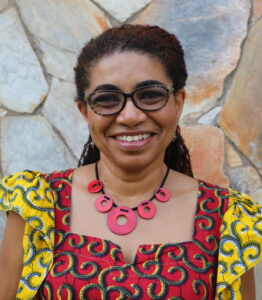Menu
Akosua Adomako Ampofo
University of Ghana

Adomako Ampofo is Professor of African and Gender Studies at the Institute of African Studies, University of Ghana (UG). She describes herself as an activist scholar, and her work is informed by her faith, questions of identity and power, and a commitment to social justice. Her areas of interest include African Knowledge systems; Higher education; Race and Identity Politics; Gender relations; Masculinities; and Popular Culture. She holds a BSc in Architectural Design and an MSc in Development Planning (KNUST, Kumasi), a PG Dip in Spatial Planning (Univ. of Dortmund), and a PhD in Sociology (Vanderbilt).
In 2005 she became the foundation Director of the University of Ghana’s Centre for Gender Studies and Advocacy and from 2010-2015 she was the Director of the Institute of African Studies. Adomako Ampofo is the founding vice-president and immediate past President of the African Studies Association of Africa; an honorary Professor at the Centre for African Studies at the University of Birmingham; and a Fellow of the Ghana Academy of Arts and Sciences. Her most recent book, co-edited with Josephine Beoku-Betts, is titled Producing Inclusive Feminist Knowledge: Positionalities and Discourses in the Global South (Bingley: Emerald Publishing 2021). She co-produced the documentary When Women Speak with Kate Skinner (and directed by Aseye Tamakloe, 2022) as part of a project titled, an “Archive of Activism: Gender and Public History in Postcolonial Ghana”. The project seeks to create a publicly accessible archive of gender activism and “political women”.
Adomako Ampofo is Editor-in-Chief, Contemporary Journal of African Studies; Co-Editor, Critical Investigations into Humanitarianism in Africa (CIHA) blog, and serves or has served on the boards of organisations such as the U.S African Studies Association; The Centre for the Advancement of Scholarship, University of Pretoria; “Africa Multiple” Cluster of Excellence, University of Bayreuth of which she is Chairperson; Perivoli Africa Research Centre, University of Bristol; Institute for Humanities in Africa, HUMA, University of Cape Town; Advisory Council, North Rhine-Westphalian Academy of International Affairs; SOS Herman Gmeiner International College; “Beyond Borders” ZEIT-Stiftung Ebelin und Gerd Bucerius Scholarship Programme; and the Next Generation of the SSRC, among others. She is a member of The Council for the Development of Social Science Research in Africa (CODESRIA); the Network for Women’s Rights in Ghana (NETRIGHT), and the Ghana Domestic Violence Coalition. She has consulted for several organisations including UNICEF, UNIFEM, UNAIDS, Save the Children, Ministry for Gender & Social Protection, Ghana; Participatory Development Associates; Gender Studies and Human Rights Documentation Centre; Kofi Annan Peacekeeping Training Centre; and WHO.
Adomako Ampofo’s work has been variously recognized: She has been a Fellow at the Rockefeller Foundation’s Bellagio centre; a Mellon Fellow at the Centre for African Studies at the University of Cape Town; a Junior Fulbright Scholar; a New Century Fulbright Scholar and a Senior Fulbright Scholar-in-Residence. In 2010 she was awarded the Feminist Activism Award by Sociologists for Women and Society (SWS). In 2015, she was the African Studies Association (of America’s) African Studies Review Distinguished lecturer; and in 2019 she delivered the Audrey Richards Distinguished Public Lecture at the Centre for African Studies at the University of Cambridge. She is the 2023-2024 Wangari Maathai Visiting Professor at the University of Kassel.
Follow her: @adomakoampofo.
Wesbite: https://adomakoampofo.com/
Talk Information:
Elvis Presley, Miriam Makeba, and Bob Marley Walk into a Bar: Cross-Examining Epistemic Violence and Working Towards Epistemic Freedom
June 16, 2023 | 9:00 AM
My reflections will seek to synthesize my thoughts over the last several years on the now very popular decolonize-and-rebuild project. Covid-19 and its attendant lockdowns, body and vaccine border controls, the disproportionate effects of COVID-19 on minorities, as well as the silencing of non-Euro based science on the epidemic have occurred. The killings of Breonna Taylor, George Floyd, and hundreds of other black and brown people by the police in the US, and an apparent increase in race-motivated violence globally, have also occurred. There has been a mass exportation of anti-LGBTQ legislation to Africa from US-based groups. While in some instances, a renewed defence of black lives, knowledge, and culture has occurred, in other cases, there have been backlashes, including, painfully, from within the academic community. And so, in my reflections, I confront practices of epistemic and embodied violence, and point to pathways to epistemic freedom, which I argue is at the core of the decolonization project. I do so through an imagined conversation between Elvis Presley, Miriam Makeba, and Bob Marley.